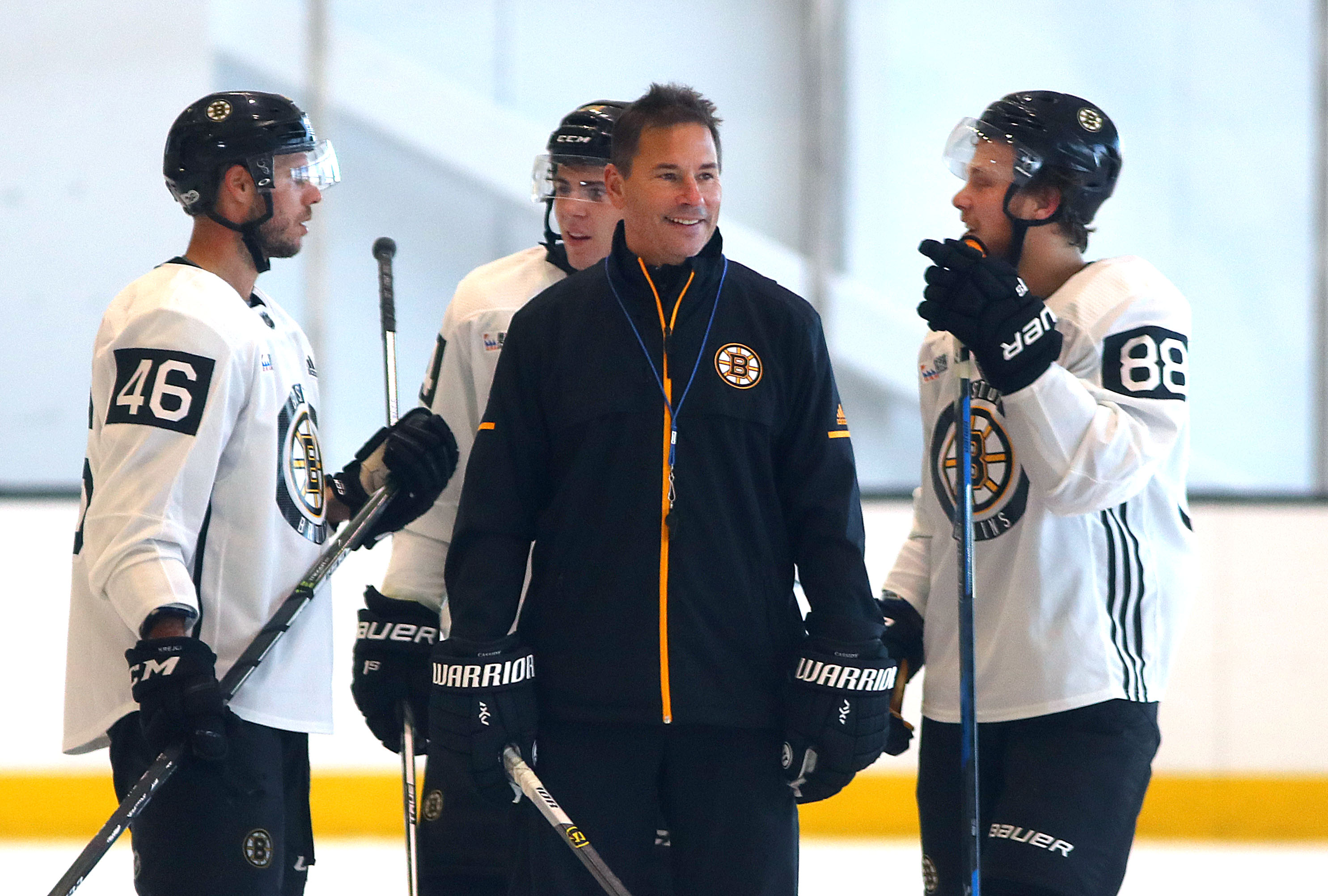
Why the Bruins fired Bruce Cassidy: Coach’s style took ‘toll’ on team, says GM Don Sweeney
Bruce Cassidy believes in candor. He has never bitten his tongue with his players when evaluating their play, reinforcing their habits and explaining concepts.
Six-plus seasons of doing so cost him his job.
“You don’t go out and get 107 points, win 51 games, if the players aren’t responding to you. It just doesn’t happen. He’s able the push the buttons that are necessary,” general manager Don Sweeney said on Tuesday, one day after firing Cassidy. “But it takes its toll. Over the course of time, it takes its toll. You’ve got to find a way to either develop that message a little differently. Or the personnel changes and you cycle it out.”

Cassidy’s Black-and-Gold past is full of accomplishments. Most recent was making the playoffs for a sixth straight time and taking Carolina to seven games.
The 2021-22 Bruins averaged a league-low 2.01 expected goals against per 60 minutes of five-on-five play, according to Natural Stat Trick. It was the sixth straight season they finished among the league’s three best teams in this metric.
Under Cassidy, Brad Marchand became the best all-around left wing in the business. Cassidy relieved Patrice Bergeron of some of his heavy defensive lifting to optimize his offensive game. David Pastrnak and Charlie McAvoy developed into superstars. He left his star players, including David Krejci and Tuukka Rask, to run the room.
Sweeney’s decision, however, was about the future. Bergeron’s time may be over. Marchand, 34, has three seasons remaining on his deal, the first of which will be shortened following hip surgery. Pastrnak, unrestricted after 2022-23, would be Sweeney’s top trade piece to initiate a rebuild.
Bruce Cassidy has been fired after six seasons that saw six playoff appearances and a Stanley Cup Final berth.
And with him goes the Bruins' championship window.
"Immediate help is not coming. Neither are Cups."
📚 @FlutoShinzawahttps://t.co/Y5WOA8q6ns pic.twitter.com/NJP58lxoHI
— The Athletic NHL (@TheAthleticNHL) June 7, 2022
All of this leaves younger players like Jake DeBrusk (25), Brandon Carlo (25), Trent Frederic (24) and Jack Studnicka (23) with greater responsibilities. All of them, at one point or another, have staggered under the load of Cassidy’s no-nonsense philosophy.
It became so bad for DeBrusk that he wanted out, even after signing a two-year, $8 million extension he hoped would facilitate that request. Whether DeBrusk has changed his thinking is unknown. Rick Valette, DeBrusk’s agent, did not respond to an inquiry regarding his client’s state of mind.
It wasn’t just the young players who slumped their heads under Cassidy’s watch. Some of the veterans, according to a source familiar with the situation, questioned whether Cassidy’s way with the youngsters was good for the room. Dissatisfaction also touched individual performance. Nick Foligno, the team’s second-oldest player at 34, did not see eye to eye with Cassidy regarding his fourth-line deployment.
“I felt that both the message and how it was being delivered — and, more important, how it was being received — young and old,” Sweeney said of how Cassidy fell short. “That’s where I referenced both younger and older players and taking ownership of it, as I would and I do with where our roster’s at and the changes I ultimately have to make. I think the players felt they were very well prepared. But at times, young and old, they struggled. Sometimes that’s the voice that’s in their head. Ultimately, I had to make a decision that takes us in a different path.”

Cassidy’s results signaled that he deserved an opportunity to evolve in 2022-23, both in his manner with players and philosophies of generating offense. Sweeney felt differently.
They have worked together since 2008, when Sweeney was director of player development and Cassidy was a first-year assistant coach in Providence. By the end, Sweeney believed he knew Cassidy well enough to determine the 57-year-old’s habits were too ingrained to amend to the degree he preferred.
“I think Bruce has evolved,” said Sweeney. “I’ve been working with Bruce for 14 years. I’ve watched him grow, and it’s the reason why I promoted him six years ago. Because I knew what his skill set as a coach was. As far as evolving, his confidence as a head coach and the messaging he wants to deliver, I think, is exactly as he wants it to be. Has it changed with the group that’s still here? And is it as effective with the group that’s still here? That was my determination — not as effective as it was. But it doesn’t mean it’s going to be less effective somewhere else.”
Sweeney’s next order of business is to hire a coach who will be quicker than Cassidy to put his arm around his players. Jay Leach and David Quinn, the two top candidates, have histories of promoting concepts like positivity and growth mindset. That neither has the experience of veterans like Mike Babcock or Barry Trotz does not eliminate them from consideration. Sweeney, however, is methodical. He will interview more candidates than less.
“I’m going to cast the net a little wider,” said Sweeney. “I don’t think it’s an absolute prerequisite. We’ve got an experienced group of guys that want to win, know how to win. And a young group of guys is the next core, Charlie and David being part of that, that hopefully can bridge and continue to bridge what that next young group is going to come in. Now a coach needs to direct that ship and be able to communicate effectively across all those age groups. That’s why I certainly want to cast the net wide enough. I don’t believe it’s an absolute prerequisite to have coached behind an NHL bench.”







